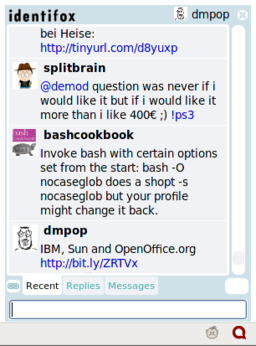Extension Watch: Denting with IdentiFox

Productivity Sauce
Identi.ca may not generate the same buzz as Twitter, but the open source microblogging service based on the Laconica engine is quickly gaining popularity among open source developers, enthusiasts, and casual users alike. While you can post and read status updates -- or dents in Identi.ca's parlance -- using the service's Web front-end, a dedicated client can help you to manage your microblogging activites more efficiently. After trying a few available microblogging tools such as Gwibber and twidge, I finally settled for IdentiFox.
It's essentially a tweaked version of the popular TwitterFox extension for Firefox, and as such it offers pretty much the same feature set. It supports multiple Identi.ca accounts which can be configured using the Preferences dialog window. Here you can also specify how often IdentiFox should get updates, the duration of the popup window, and a couple of keyboard shortcuts. IdentiFox's interface contains three tabs: Recent (the latest dents from people you subscribe to), Replies ("@yourusername" replies), and Messages (direct messages to you). The link button lets you insert the URL of the current Web page in the message area, while the character count field helps you to stay within the 140-character limit. Finally, shortcut icons next to each dent allow you to reply to the dent or mark it as a favorite. Obviously, IdentiFox is not the most advanced Identi.ca client out there, but it makes it extremely easy to post and read dents without leaving the convenience of your favorite browser.
comments powered by DisqusSubscribe to our Linux Newsletters
Find Linux and Open Source Jobs
Subscribe to our ADMIN Newsletters
Support Our Work
Linux Magazine content is made possible with support from readers like you. Please consider contributing when you’ve found an article to be beneficial.

News
-
New Linux Botnet Discovered
The SSHStalker botnet uses IRC C2 to control systems via legacy Linux kernel exploits.
-
The Next Linux Kernel Turns 7.0
Linus Torvalds has announced that after Linux kernel 6.19, we'll finally reach the 7.0 iteration stage.
-
Linux From Scratch Drops SysVinit Support
LFS will no longer support SysVinit.
-
LibreOffice 26.2 Now Available
With new features, improvements, and bug fixes, LibreOffice 26.2 delivers a modern, polished office suite without compromise.
-
Linux Kernel Project Releases Project Continuity Document
What happens to Linux when there's no Linus? It's a question many of us have asked over the years, and it seems it's also on the minds of the Linux kernel project.
-
Mecha Systems Introduces Linux Handheld
Mecha Systems has revealed its Mecha Comet, a new handheld computer powered by – you guessed it – Linux.
-
MX Linux 25.1 Features Dual Init System ISO
The latest release of MX Linux caters to lovers of two different init systems and even offers instructions on how to transition.
-
Photoshop on Linux?
A developer has patched Wine so that it'll run specific versions of Photoshop that depend on Adobe Creative Cloud.
-
Linux Mint 22.3 Now Available with New Tools
Linux Mint 22.3 has been released with a pair of new tools for system admins and some pretty cool new features.
-
New Linux Malware Targets Cloud-Based Linux Installations
VoidLink, a new Linux malware, should be of real concern because of its stealth and customization.

